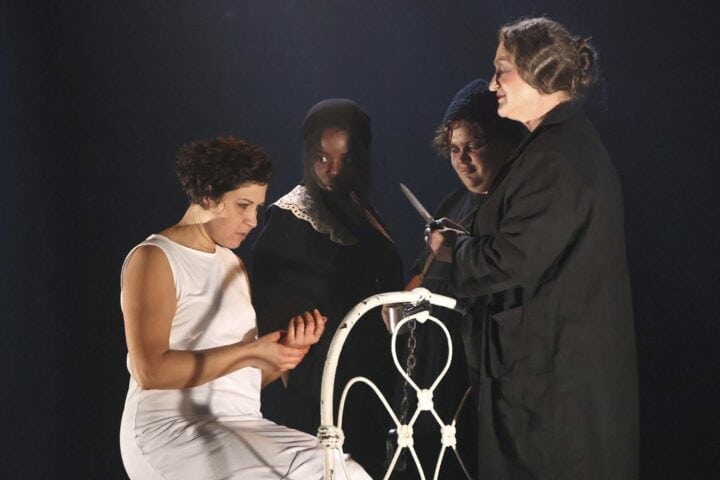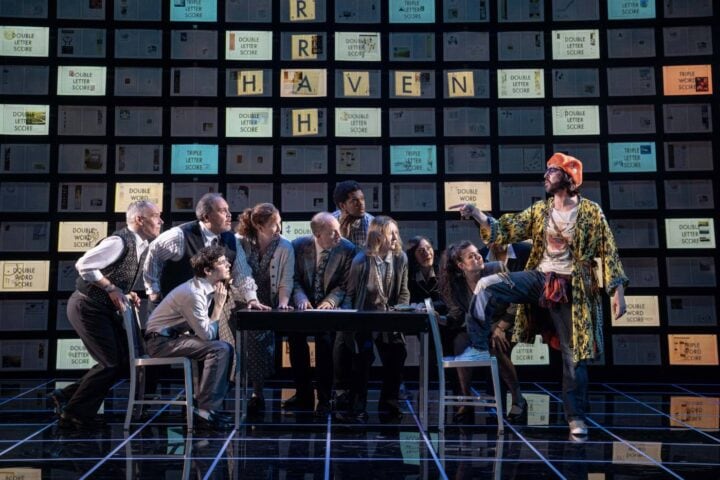William Shakespeare’s Pericles, Prince of Tyre ends with a pair of near-resurrections, as the titular protagonist reunites with his daughter and wife, each long-thought dead. It’s only fitting, then, that Fiasco Theater’s production of Pericles, running at the Classic Stage Company until March 24, is an electrifying act of double-resurrection itself.
Pericles is one of Shakespeare’s late romances, blurring lines between genres and toying with fantastical scenes of rebirth, and it’s right in Fiasco’s wheelhouse: the troupe burst on to the scene with a six-actor production of another work in the genre, Cymbeline, in 2011. Gorgeously giddy New York productions of Measure for Measure and The Two Gentlemen of Verona, so-called comedies with disquieting dark turns, followed, in 2014 and 2015, respectively. But some of Fiasco’s more recent early modern undertakings, like a weirdly froth-less Twelfth Night at Classic Stage in 2017 and an overly chaotic reinvention of Francis Beaumont’s Knight of the Burning Pestle last season, have suggested the company might be starting to spin its wheels.
Fear no more: Fiasco’s Pericles is a revelation, a revivification of New York theater’s most essential ensemble and a redemption for a play seldom produced and even less seldom praised. Things, though, do start out somewhat unconvincingly. Pericles is thought to be a collaboration between Shakespeare and George Wilkins, an abusive innkeeper whom scholars think probably was running a brothel, and it’s in the rather un-Shakespearean first act (typically attributed to Wilkins) that Fiasco unsurprisingly finds the greatest challenge.
The play launches, barely, with the hero presented with a riddle that, if solved correctly, will win him the hand of the princess of Antioch. As soon as he reads the couplet, “He’s father, son, and husband mild/I mother, wife, and yet his child,” Pericles cracks the queasy code—the princess is in an incestuous relationship with her father—so the king plans to have him executed before he can spill the beans. Why the king would keep offering this big, bad secret to prospective sons-in-law in riddle form is an unexplained psychological conundrum (perhaps the unpracticed Wilkins is to blame), and Fiasco handles this half-baked plotline with kid gloves.
Fortunately, as soon as Pericles flees to Pentapolis to the court of King Simonides (Andy Grotelueschen), where the prince falls for the king’s daughter, Thaisa (Jessie Austrian), the play whirs to life and never slackens its pace again. In fact, time flies in this joyous Pericles, directed simply but never simplistically by Ben Steinfeld, one of Fiasco’s triumvirate of co-artistic directors and an occasional on-stage presence here as the narrating medieval poet Gower.
Steinfeld makes wise use of Classic Stage’s flexible but oft-unwieldy thrust stage with its multiple levels and semi-visible backstage area: The characters appear on the balcony only once, through a scrim during a storm scene, and the sudden expansion of the playing space successfully startles. Mostly, the ensemble builds the scenery together, constructing benches and thrones and doorways out of wooden crates and coffins.
Steinfeld also adds a small handful of original songs into the narrative, and not just for atmosphere, though the entire ensemble offers a few potent choral moments throughout. Steinfeld’s score actually feels occasionally like a mini-tryout for a fully realized Pericles musical in the spirit of the Public Theater’s Public Works Shakespeare musicals, with one duet for Thaisa and Pericles, “Hope on the Horizon,” an especially effective dramatic piece.
Leaning into both the episodic nature of the story and the theme of transformation, four of the nine cast members portray Pericles, passing along the crown to the next performer at critical junctures in the prince’s odyssey. And while the gesture is clear throughout, Devin E. Haqq’s final Pericles is so richly, tenderly rendered that one might wish he’d played the role solo.
But by making the central figure so malleable, Fiasco also emphasizes the scene-stealing cavalcade of characters whom Pericles encounters on his journey, from a wicked queen (Tatiana Wechsler), a sort of mashup of Cymbeline and Snow White, to a lustful governor (Paco Tolson) lured into pious repentance by Pericles’s toughly principled daughter Marina (Emily Young).
Each of these cameos—most of the roles appear for only a scene or two—are brought to brisk life by the ensemble with wrenching clarity that never tips over into cartoonishness or parody. Chiefly glittering among the troupe are Austrian (another of Fiasco’s co-artistic directors) and Grotelueschen (a Tony nominee for Tootsie) who pair up for the play’s two brightest moments.
First, there’s a lovely, teasing (and thankfully non-incestuous) daughter-dad rapport between Austrian’s Thaisa, who quickly falls for Pericles, and Grotelueschen’s Simonides, a kind of Dad Joke King who charmingly pranks his son-in-law-to-be with fake outrage at his daughter’s crush. Austrian and Grotelueschen give us everything we need to see to understand the relationship in mere moments—when Thaisa realizes that her father has given Pericles the secret letter that she’s written declaring her love, she unleashes a mighty shriek of exasperation: The king is clearly up to this kind of embarrassing thing all the time.
And while Thaisa’s off stage for much of the second half of the play (sheltered in a temple after she survives being thrown overboard in a coffin), the two actors reappear as a brothel-mistress and her put-upon servant, with Austrian as a sort of Mediterranean Miss Hannigan, worn down by the unseemly, distracting presence of virtue in her vice-embossed establishment. These brothel scenes have ground other lesser productions of Pericles to a creaky, strained halt, but, as in their crystalline Measure for Measure, Fiasco relishes the raunchy underbelly of Shakespeare’s worlds, and Austrian is the company’s supreme juggler, balancing the bawdy and the beautiful from scene to scene, sometimes even moment to moment.
Too often in mediocre productions of Shakespeare’s plays the language can feel superfluous, even burdensome. When less diligent care is taken, the poetry can hang limply over the plot. What Fiasco does so stunningly well is to elucidate contemporary meaning from early modern text, not by imposing their own modern vision, but by digging deeply into the language and practically repotting it, inviting the words to sprout from fresh soil, revealing Shakespeare’s characters, as they flower, to be more precisely human than we ever realized.
Take the tonal transition after Thaisa’s tearful reunion with Pericles and Marina. Helicanus (Paul L. Coffey), Pericles’s trusty servant who’s never met Thaisa before, interrupts the familial embrace to hail the return of his lost queen, and Thaisa cuts off him off with a half-apologetic, half-annoyed response: “I know you not.” As delivered with typically needle-sharp timing by Austrian, it’s a comic twist rooted in the reality of the character and the moment. Her reading fully convinces that Shakespeare meant the line as a joke, and someone finally noticed.
Pericles is now running at the Classic Stage Company.
Since 2001, we've brought you uncompromising, candid takes on the world of film, music, television, video games, theater, and more. Independently owned and operated publications like Slant have been hit hard in recent years, but we’re committed to keeping our content free and accessible—meaning no paywalls or fees.
If you like what we do, please consider subscribing to our Patreon or making a donation.





